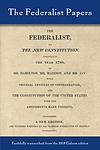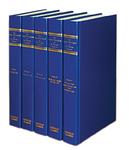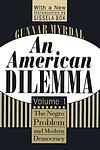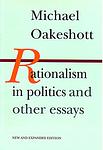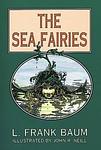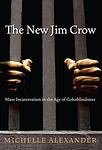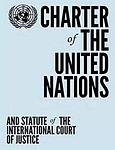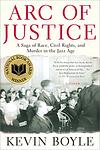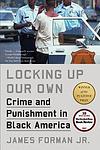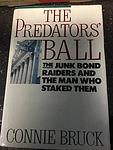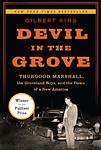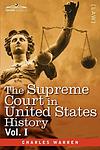The Greatest "Law" Books of All Time
Click to learn how this list is calculated.
This list represents a comprehensive and trusted collection of the greatest books. Developed through a specialized algorithm, it brings together 284 'best of' book lists to form a definitive guide to the world's most acclaimed books. For those interested in how these books are chosen, additional details can be found on the rankings page.
Genres
The category of "Law" in books encompasses a wide range of topics related to legal systems, regulations, and principles. It includes books on various branches of law such as criminal law, civil law, international law, and constitutional law. These books may cover topics such as legal theory, court cases, legal history, and legal practice. The category of "Law" is essential for those interested in understanding the legal system and its impact on society. It is a valuable resource for law students, legal professionals, and anyone interested in the legal field.
Countries
Date Range
Reading Statistics
Click the button below to see how many of these books you've read!
Download
If you're interested in downloading this list as a CSV file for use in a spreadsheet application, you can easily do so by clicking the button below. Please note that to ensure a manageable file size and faster download, the CSV will include details for only the first 500 books.
Download-
1. The Gulag Archipelago by Aleksandr Solzhenitsyn
"The Gulag Archipelago" is a comprehensive and stark account of the Soviet Union's forced labor camp system. The narrative, based on the author's own experiences as a prisoner and on extensive research, documents the history, operation, and life inside the Gulag system. It also provides a critical examination of the regime's legal system, police operations, and political leadership. The book is an intense indictment of the Soviet Union's totalitarian regime, revealing its brutality, inhumanity, and vast scale of its prison camp network.
-
2. The Federalist Papers by Alexander Hamilton, James Madison, John Jay
"The Federalist Papers" is a collection of 85 articles and essays written to promote the ratification of the United States Constitution. These works discuss the benefits of a stronger national government, the proposed structure of the government, and the division of powers among its various branches. They also address criticisms of the Constitution and detail the failures of the Articles of Confederation. The papers remain a primary source for interpretation of the U.S. Constitution and the intentions of its framers.
-
3. Reflections on the Revolution in France by Edmund Burke
This book is a political pamphlet written in the 18th century, where the author criticizes the French Revolution, arguing that it has gone too far in its quest for radical change. He asserts that the revolutionaries, in their rejection of tradition and their embrace of abstract notions of liberty and equality, have overlooked the complexities of real social and political life. The author advocates for gradual, prudent reform rather than sudden, violent change and emphasizes the importance of tradition and inherited institutions.
-
4. Summa Theologica by Thomas Aquinas
This comprehensive text is a seminal work in the field of theology, written by a prominent medieval philosopher and theologian. The book is structured in a question-and-answer format, tackling complex philosophical and theological issues such as the existence of God, the nature of man, the purpose of life, and the intricacies of morality and ethics. It is one of the most influential works in Western thought, particularly in Christian theology and philosophy, and continues to be a vital reference in these fields.
-
5. A Theory of Justice by John Rawls
This book presents a seminal work in modern political philosophy, where the author proposes a model of justice that, despite being egalitarian, respects individual rights. The author's "veil of ignorance" thought experiment, which suggests designing society from an original position where no one knows their future place in society, has been particularly influential. The author argues that this would lead to a system where each individual is assured basic liberties and socio-economic inequalities are only allowed if they benefit the least advantaged members of society.
-
6. Twenty Years at Hull-House by Jane Addams
"Twenty Years at Hull-House" is a memoir that recounts the author's experiences co-founding and running a settlement house in a poverty-stricken, immigrant neighborhood in Chicago. The book details the struggles and triumphs of the community as they navigate social, economic, and cultural challenges, while also offering insight into the author's own evolution as a social reformer. Throughout, the author emphasizes the importance of empathy, understanding, and community engagement in addressing social inequality.
-
7. An American Dilemma by Gunnar Myrdal
This book is a comprehensive sociological study on the issues faced by African Americans in the United States during the mid-twentieth century. The author examines the deep-rooted racial discrimination and inequality prevalent in American society, exploring its origins, implications, and potential solutions. The work is notable for its detailed analysis and its impact on subsequent civil rights movements.
-
8. The Journalist and the Murderer by Janet Malcolm
The book is a gripping exploration of the uneasy relationship between journalists and their subjects. It delves into the ethical dilemmas faced by journalists when they become too involved with their subjects. The narrative centers around a lawsuit between a convicted murderer and the author who wrote about his case, revealing the blurred lines between objectivity and subjectivity in journalism. The book also raises questions about the morality and responsibility of the journalistic profession.
-
9. Rationalism in Politics by Michael Oakeshott
"Rationalism in Politics" is a collection of essays that critique the role of rationalism in politics, arguing that political decisions should be based on tradition and experience rather than abstract theories. The author asserts that rationalism, with its emphasis on premeditated, systematic approaches, often fails to acknowledge the complexity and unpredictability of human behavior and social dynamics. He emphasizes the importance of practical knowledge, acquired through experience, in political decision-making and criticizes the rationalist's disregard for such wisdom.
-
10. The Case Worker by György Konrád
"The Case Worker" is a novel that follows the life of a young, disillusioned social worker in Hungary who is struggling with the grim realities of his job. He is constantly faced with the harsh and desperate situations of his clients, which include the poor, the mentally ill, and the elderly. As he tries to help them, he becomes increasingly aware of the bureaucratic and social systems that often hinder rather than aid these vulnerable individuals. This leads him to question the effectiveness of his role and the larger societal structures in place.
-
11. Democracy and Leadership by Irving Babbitt
"Democracy and Leadership" is a critical examination of modern democracy, its strengths, and its potential weaknesses. The author delves into the nature of leadership within democratic systems, questioning the effects of populism and mass movements on the quality of leaders. He argues for a balance between individual freedom and societal responsibility, advocating for a more ethical and principled approach to leadership. The book also explores the impact of humanism and romanticism on democratic thought, suggesting that these philosophies can either enhance or undermine the democratic process.
-
12. The Sea by John Banville
"The Sea" is a profound exploration of memory, grief, and loss. The novel follows the story of a widower who returns to a seaside town where he spent his childhood summers. His present-day experiences are interwoven with memories of a transformative event from his youth involving a wealthy family he befriended. As he grapples with the loss of his wife to cancer, he also deals with the haunting memories of the past. The narrative is a deep dive into the human psyche, exploring themes of love, loss, and the fluidity of time.
-
13. The New Jim Crow by Michelle Alexander
"The New Jim Crow" is a thought-provoking and eye-opening book that examines the deeply ingrained racial bias within the American criminal justice system. Drawing on extensive research and personal anecdotes, the author explores how the War on Drugs has disproportionately targeted and marginalized Black communities, leading to a modern-day system of racial control and oppression. This powerful critique challenges readers to confront the systemic racism that continues to perpetuate inequality and injustice in the United States.
-
14. Roughing It by Mark Twain
This book is a semi-autobiographical travelogue that chronicles the author's journey across the American West to Nevada. It covers his experiences as a miner, newspaper reporter, and lecturer, and includes humorous and insightful observations about the people, places, and culture he encounters. The narrative also provides vivid descriptions of the natural landscape, as well as commentary on the social and political issues of the time.
-
15. Charter of the United Nations by United Nations
This book is a comprehensive guide to the Charter of the United Nations, an international treaty that lays out the responsibilities and rights of its member nations, and establishes the structure and functions of the United Nations. It explains the principles of international relations, the promotion of human rights, and the commitment to peace and security. The book is an essential resource for understanding the basis of international law and the global governance system.
-
16. Just Mercy by Bryan Stevenson
This book is a profound work of non-fiction that focuses on the author's experiences as a young lawyer fighting for the rights of those wrongfully convicted or excessively punished. The narrative primarily revolves around the case of a black man sentenced to death for a crime he didn't commit. The author not only exposes the inherent racial bias and systemic flaws in the American criminal justice system, but also provides a compelling argument for compassion in the pursuit of justice.
-
17. Arc of Justice by Kevin Boyle
"Arc of Justice" is a riveting and complex story that unfolds in the racially tense backdrop of 1920s Detroit. The narrative follows an African American physician who moves his family into a predominantly white neighborhood, resulting in a chain of violent events. The doctor stands trial for murder, and the case garners national attention. The book delves into the doctor's fight for justice and the broader societal implications of racial tension, prejudice, and civil rights in America.
-
18. Locking Up Our Own: Crime and Punishment in Black America by James Forman
This book delves into the complex and controversial issue of mass incarceration in the United States, particularly within the African American community. It explores the historical, social, and political factors that contributed to the high rates of black imprisonment. The author examines the role of African American leaders in advocating for tough-on-crime policies and their unintended consequences. The book is a thought-provoking analysis of the intersection of race, crime, and justice in America.
-
19. A Civil Action by Jonathan Harr
This book is a non-fiction account of a water contamination case in Woburn, Massachusetts. A determined lawyer fights on behalf of eight families whose children have died from leukemia caused by industrial pollution. The narrative explores the complex legal battle against two large corporations, revealing the intricacies of the American legal system, the sacrifices required for justice, and the impact of corporate power on individual lives.
-
20. Newjack: Guarding Sing Sing by Ted Conover
The book is a first-hand account of the author's experience working as a correctional officer at Sing Sing prison in New York. Through his narrative, the author provides an in-depth look at the American penal system, revealing the harsh realities of prison life, the struggles faced by inmates, and the moral and ethical dilemmas faced by the staff. The author's year-long journey as a prison guard offers a unique perspective on the often overlooked aspects of the criminal justice system.
-
21. The Predators' Ball by Connie Bruck
"The Predators' Ball" is an investigative piece that dives into the world of high-stakes Wall Street finance during the 1980s. The book focuses on the rise and fall of a prominent investment banking firm, highlighting its role in the junk bond market and the leveraged buyout boom. It offers an in-depth look into the firm's practices, its key players, and the ethical and legal issues that eventually led to its downfall. The book also provides a critical examination of the broader financial industry during this time, exploring the impact of deregulation and the culture of greed and excess.
-
22. The Color Of Law by Richard Rothstein
"The Color of Law" by Richard Rothstein explores the deeply ingrained history of racial segregation in the United States, particularly focusing on the role of government policies and practices. Through extensive research and analysis, Rothstein uncovers how discriminatory housing policies, such as redlining and racially restrictive covenants, were systematically implemented by federal, state, and local governments, perpetuating racial inequality and segregation. The book challenges the notion that segregation was solely a result of individual choices or private prejudices, emphasizing the significant role of government actions in shaping the racial landscape of America.
-
23. A Problem from Hell: America and the Age of Genocide by Samantha Power
This book examines the United States' response to genocides in the twentieth century, including those in Armenia, the Holocaust, Cambodia, Iraq, Bosnia, and Rwanda. The author argues that America's political leaders have consistently ignored or downplayed the severity of these genocides, and she explores the reasons behind this inaction. The book also profiles individuals who have fought to bring attention to these atrocities and hold the perpetrators accountable.
-
24. Devil in the Grove: Thurgood Marshall, the Groveland Boys, and the Dawn of a New America by Gilbert King
The book is a gripping account of the Groveland Boys, four African American men falsely accused of raping a white woman in Florida in 1949, and the efforts of Thurgood Marshall, a future Supreme Court justice, to defend them. The narrative delves into the depths of racial injustice and violence in the Jim Crow South, and shows how Marshall's fight for the Groveland Boys helped to lay the groundwork for the Civil Rights Movement and the desegregation of America.
-
25. The Supreme Court in United States History by Charles Warren
This book offers a comprehensive historical overview of the United States Supreme Court from its inception to the early 20th century. It delves into the evolution of the court's role, its landmark decisions, and its impact on American society. The author provides a detailed analysis of the court's most significant cases, the justices who presided over them, and how their rulings have shaped the nation's legal and political landscape.
Reading Statistics
Click the button below to see how many of these books you've read!
Download
If you're interested in downloading this list as a CSV file for use in a spreadsheet application, you can easily do so by clicking the button below. Please note that to ensure a manageable file size and faster download, the CSV will include details for only the first 500 books.
Download
